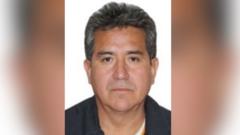Dávila's extradition on Thursday follows approval from Bolivia's Supreme Court in late November, and he has been imprisoned on corruption charges since February 2022. He faces a U.S. indictment involving cocaine trafficking and weapons charges. The U.S. Department of State claims that during his leadership of Bolivia's Special Forces for the Fight Against Drug Trafficking (FELCN), Dávila misused his position to aid cocaine transport to other countries, ultimately aiming at distribution in the U.S. If found guilty, he could serve a minimum of 10 years to life in prison. The U.S. previously offered a $5 million reward for information related to his prosecution.
Dávila served as FELCN director under the administration of former President Evo Morales (2006-2019), who has rebuked the extradition, suggesting it reflects Bolivia's subjugation to U.S. influence. Morales, himself facing investigations for serious allegations, claims that handing Dávila over violates international agreements and calls into question Bolivia's judicial integrity.
The political fallout is evident with Morales's supporters organizing protests and blockades demanding an end to the investigations against him amidst allegations of assassination attempts and government conspiracies. The dynamics surrounding Dávila's extradition highlight the intricate relationship between Bolivia and the U.S., raising concerns over sovereignty and the implications of international legal cooperation against drug-related crimes.
Dávila served as FELCN director under the administration of former President Evo Morales (2006-2019), who has rebuked the extradition, suggesting it reflects Bolivia's subjugation to U.S. influence. Morales, himself facing investigations for serious allegations, claims that handing Dávila over violates international agreements and calls into question Bolivia's judicial integrity.
The political fallout is evident with Morales's supporters organizing protests and blockades demanding an end to the investigations against him amidst allegations of assassination attempts and government conspiracies. The dynamics surrounding Dávila's extradition highlight the intricate relationship between Bolivia and the U.S., raising concerns over sovereignty and the implications of international legal cooperation against drug-related crimes.




















